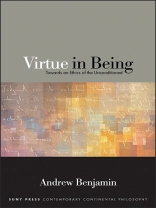A radical rethinking of ethics set within the development of a philosophical anthropology.
In his last book, Towards a Relational Ontology, Andrew Benjamin provided a philosophical account of what he terms anoriginal relationality, demonstrating how this concept can be seen to be at work throughout the history of philosophy. In Virtue in Being, he builds on that project to argue for a new way of understanding the relationship between ontology and ethics through insightful readings of texts by Immanuel Kant, Hannah Arendt, and Jacques Derrida. Structuring the book around the themes of violence, evil, and pardon, Benjamin builds a convincing case for the connections he draws between thinkers not commonly associated with one another.
Inhoudsopgave
Acknowledgments
Introduction
1. Toward the Unconditioned: Kant, Epicurus and Glückseligkeit
2. Arendt and the Time of the Pardon
3. Kant, Evil, and the Unconditioned
4. Judgment after Derrida
Notes
Bibliography
Index
Over de auteur
Andrew Benjamin is Professor of Philosophy and Jewish Thought at Monash University, Australia and Distinguished Professor of Philosophy and Humanities at Kingston University, London. He is the author of Towards a Relational Ontology: Philosophy’s Other Possibility and the coeditor (with Dimitris Vardoulakis) of Sparks Will Fly: Benjamin and Heidegger, both also published by SUNY Press.












